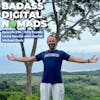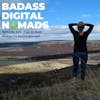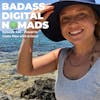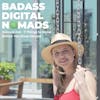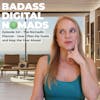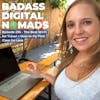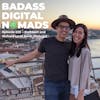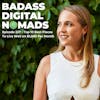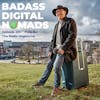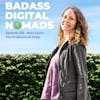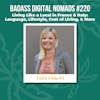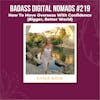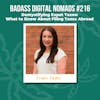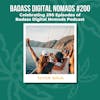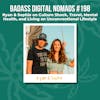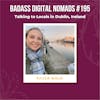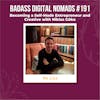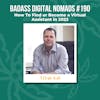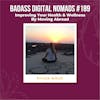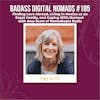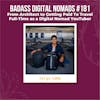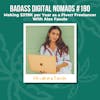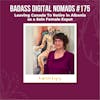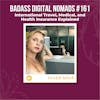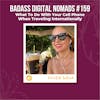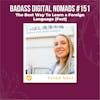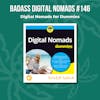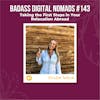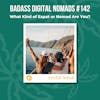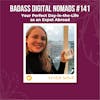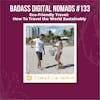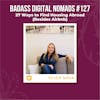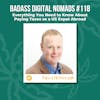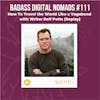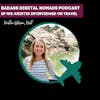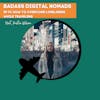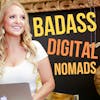How To Create and Monetize a Personal Brand in the Age of Remote Work
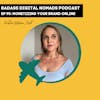
Societal change is upon us. How can you combine your skills and personality to make money online in the new economy? Get ideas and inspiration in this episode of Badass Digital Nomads, especially for aspiring writers and content creators.
Technology and the pandemic have changed society as we knew it – ushering in a time of unpredictability and flux. Change is here, causing many people to shift their priorities, question their roles in society, and re-design their plans in life.
If you’ve been questioning if “the system” is working for you while struggling to redefine your dreams and goals while finding new ways to support yourself, you’re not alone. Fortunately, the tools now exist for you to not only learn how to not only get by, but to thrive by leveraging and monetizing your unique passions and strengths.
This episode of Badass Digital Nomads is about how your personal story and expertise can be key in succeeding in the remote economy.
Listen for tips on figuring out which remote jobs best suit you and your skills, how to face the challenges of shifting to full-time remote work, and the many opportunities that come from being a content creator and digital nomad. I also offer advice on how to help more people with less work (especially if you’re a coach) and how to differentiate yourself from other content creators.
Do you want to create a personal brand, expand your personal network, hone your skills, and experience more creative and financial freedom?
Tune in to learn why now is the best opportunity to create and monetize your personal brand and how to take the first steps – whether you’re an employee, freelancer, or entrepreneur.
TOPICS DISCUSSED/WHAT YOU’LL LEARN:
- What my digital nomad life has looked like up until today
- Why I decided to stay in one place during the pandemic
- Where to find high-paying remote work
- The challenges of shifting towards making money online
- How to turn $1 into $10k
- Monetizing your personal brand on YouTube, Medium, Instagram, and other social media platforms
- The endless opportunities for networking and growth as a content creator
- How to take back the power of the media and become your own media company
- Differentiating yourself from other content creators
- How to work less and help more people
SHOW NOTES & RESOURCES
- Story2021 Digital Content Masterclass Series
- Book: Digital Nomad
- Videos:
- My Favorite Medium Writers:
- Digital Nomad Resources:
.......................................................................................................
Thank you to my current 2021 Patrons! Teklordz, Trader Walt, Shawn, Karen, Christine, Erik, Heather, Colin, Craig, RZ, Timothy, James, Richard, Fred, Lakshay, Issac, George, Scott, Michael J, Derek, Issac, George, Mike M., Yasmine, Heather, and Cynthia.
My goal is to create a community of 100 Patrons in 2021! You can become a Patron for $5/month at Patreon.com/travelingwithkristin and see all my YouTube videos first, attend monthly live streams, submit questions for the podcast, and be the first to find out about special offers and guests, as well as the chance to participate in beta programs at free or discounted rates.
.......................................................................................................
Support the Badass Digital Nomads Podcast:
- Become a Patron for $5 per month
- Leave a 5* Review: https://lovethepodcast.com/digitalnomad
- Buy Official Merch
- Search All Episodes: www.badassdigitalnomads.com
Connect with Kristin on Social Media:
- Follow on Instagram
- Subscribe to Traveling with Kristin on YouTube
- Subscribe to Digital Nomad TV on YouTube
- Join the Badass Digital Nomads Facebook Group
Podcast descriptions may contain affiliate links of products and services we use and recommend at no additional cost to you.
Sneak Peek:
Kristin: 00:00:00 Everyone just to start thinking about themselves as little media companies that are publishing out into the atmosphere and making things happen, that is the way you're going to be able to share your story. That's the way you're going to feel more fulfilled, expressing who you are as a person. And that's the way you're going to get more clients, more contacts, more referrals. You're gonna be able to help more people, and that's how you're gonna be able to set yourself apart through all of the noise.
Introduction: Welcome to Badass Digital Nomads, where we're pushing the boundaries of remote work and travel, all while staying grounded with a little bit of old school philosophy, self-development, and business advice from our guests.
Kristin: 00:00:46 Hi everyone. Kristin from Traveling with Kristin here. And before we get into today's episode, I wanted to let you know about another podcast that you should definitely subscribe to. My friend Mikkel Thorup is the host of The Expat Money Show. A top rated podcast for people like you who love to travel, are looking for more freedom in their lives, and who are curious about living abroad and the expat lifestyle. With more than 100 episodes to date, Mikkel goes deep into topics like offshore citizenship banking and investing. Mikkel is one of the few people I've met in this space who definitely knows what he's talking about. He's traveled to more than 100 countries in the last 20 years and lived in eight of them as a full-time expat. The Expat Money Show is available on Apple Podcasts, Stitcher Radio, or anywhere popular podcasts are found. There's a new episode every single week and previous notable guests have included Jim Rogers, Doug Casey, John Perkins, Grant Cardone, and yours truly, Kristin Wilson. Subscribe to The Expat Money Show today and make sure to catch Mikkel's episode 71 of Badass Digital Nomads on How to live, work and invest offshore. And now on with today's show.
Kristin: 00:02:27 Hi everyone, Kristin from traveling with Kristin here. And today's episode of Badass Digital Nomads is an interview I did for an online summit called Story2021. Story2021 was a digital content masterclass that brought together 21 top digital innovators, writers, and entrepreneurs to share our tips on how you can earn an online income through content creation. So the concept behind this event was basically to explore how regular people in any industry can forge a new career path and create a new revenue stream by using their personal stories and through creating a personal brand. I'll link to the full list of speakers in the show notes if you wanna explore more about it. 'cause there were people who talked about everything from creating digital products to making money with freelance writing, to building Facebook communities. And it was all with this same thread of using the power of the internet and the media platforms that we all have access to today to make that happen.
Kristin: 00:03:42 So I like to share the interviews that I do with other people on the show sometimes because it kind of flips things around and gives you a different perspective, uh, having other people interviewing me rather than me doing solo casts or me interviewing my guests. So some of the questions that the host Sean asked me in this interview include things like how I became a digital nomad, what steps people should take to make money online, where I get my inspiration from to create content, and why you should think of yourself as a mini media company, whether you are a salaried employee or an online business owner or freelancer. So again, you can get more info about the event and check out the other speakers in the show notes. But before we start, shout out to Kareem from the United States who left a review on castbox for the recent podcast that I did on loneliness while traveling. He says, Kristin, such an amazing podcast. Been listening to several others. This one resonates so much. Thank you for your work. And I've gotten a lot of messages from people about that loneliness while traveling podcast. My patrons loved it too. Shout out to Sean who sent me an email on that one. So, um, I'm glad to hear that you guys like it. Thank you for all of your comments and reviews, and thank you for listening right now. I hope you enjoy today's show.
Podcast Interview:
Sean: 00:05:29 Hi, I'm Sean Smith. Welcome to Story2021.co. I'm here today with our most excellent speaker, Kristin Wilson, digital nomad extraordinaire. She is going to talk to us about her life's work and journey as a digital nomad, and I am thrilled to introduce Kristin. Kristin, tell us about you. There's this story I have, I have say there's the story that I read, read where your parents asked you what you wanted to be when you grew up and what did you tell them?
Kristin: 00:06:02 I told them I would have to invent my own job because apparently there was no job for me on the list of jobs in the middle school career inventory test <laugh>. So at a very young age as a, as a pre-teen as it were. Very good student, very dedicated student except for in one area. And that was in figuring out what I wanted to do or be when I grew up. And so after famously flunking every single personality and career test that could match you with a job, like I would literally get an error message back. Whereas my classmates would get something like their top three jobs, you know, like lawyer and doctor or firefighter or forest ranger or all of those cliche jobs like you would be a perfect fit for human resources manager. And mine was just like undefined. I was like, what does that even mean, <laugh>?
Kristin: 00:06:59 Is there a problem here? You know, asking the teacher and hindsight is always 2020 as you know. And so looking back on that, I'm like, wow, everything makes sense now because here we are in 2020 where even before the pandemic A.I was coming for your job, so you had to be able to create a new job and in many cases make one up. And so I've been doing just that inadvertently for my entire career. And now I feel like that's part of my duty to help teach other people how to do that because each and every one of us was brought up in a traditional education system that was not meant for people to create their own jobs or even to think that they are creative. It was meant to mold very good factory workers who would come out of that system and get traditional jobs and follow the rules and fit in with society and follow the linear model of modern day life.
Kristin: 00:08:06 But that system is outdated and no one was really prepared for it. So now we're, everyone's finding themselves at a time where they have to look at things from a different perspective. They might have to change their careers, redefine what they do, and even redefine who they are as individuals and not just identify with their job title or the company that they work for, but like really think deeper about who they are and what they are best cut out to do on this planet. And then do it. And it's great that you're having the summit because sharing your individuality through content and replicating that at a zero marginal cost of production basically across whatever your chosen platform is, is an unprecedented way to share your story, to share who you are, to share what you're good at doing, to share how you can help other people accomplish their goals. And so it's like this whole ecosystem that has always existed except for we were always taken out of it and just, you know, making widgets and punching in and punching the clock and not fully embodying the potential of each individual in life. Because the point was not to be an individual, the point was to follow the rules and stay in your lane.
Sean: 00:09:36 Yeah, no, I can completely relate to that. I worked for 27 years straight with never more than a week or two off at a time. And it was very much defined by title and square footage of office space and number of windows, and then of course the salary. And, and I and I relied on those things, you know, and along came 2020 and the apple cart goes upside down and suddenly I, like millions of other people around the world, found myself in the middle of a digital landscape that I didn't understand, that I didn't know how to participate in, and that I didn't know how to cobble together an income stream. And, and so what I did was I went out and I found 21 excellent speakers who have been doing that for a while now, like you and each one from a a different perspective. I called it 320 degree view of the problem. It's not quite 360, but I like to boil the ocean a little. I'm thrilled to have you here and I can't wait to hear about your journey and how you built this and how you work with others in the way that the last year has gone for you. How has the last year gone for you as a digital nomad? First of all, tell us what a digital nomad is because it's not really, there's, there's not, like, it's not on the job board in middle school.
Kristin: 00:10:59 Exactly. So remind me, I wanna talk about an article by the New York Times that came out that said the digital nomads weren't prepared for this because I've been meaning to write a letter to the editor because I did two podcasts and wrote an article on medium about why digital nomads were best prepared to confront the pandemic and why we adapted better than anyone else. So that's just clickbait negativity that they're posting up there. But a digital nomad is not a job title unless that's part of your personal brand in some way. Like even for me, I'm teaching people how to become digital nomads, but there's different ways to do that. Being a digital nomad basically just means that you can work from anywhere that your job is not dependent on any geographical location. And so you can just basically live and work where you want and your work is online so it can go with you.
Kristin: 00:11:59 And I didn't even know what a digital nomad was until after I was one, because there was a book called Digital Nomad that came out in 1997 when I was a freshman in high school. I didn't read it until recently, but it was built, uh, it was written by two computer engineers who foresaw this digital nomad lifestyle becoming a thing. And they're the ones who gave a name to the lifestyle. Um, but it's basically the concept of bringing your office around with you, whether it's on your laptop or your phone just connected with an internet connection. So this is something that was already happening organically before the mainstream kind of picked up on that moniker. But, um, for many years I was simply living and working in a different country as an expat. So somebody who lives in a country for a determined period of time just to work there.
Kristin: 00:12:54 So I worked in Central America doing real estate, and then after a career in real estate and bouncing around to so many different countries, I then started at a relocation company and I built this relocation company in a way that I didn't have to physically be anywhere that I was serving my clients. So I was the central project manager working online, relocating people to everywhere from Malta to Mexico and sourcing teams in each place that if I needed a driver or a translator or somebody in person, they could serve my client there. And then I just started traveling full-time for fun because why not? And that's what happened. And after about 15 years of living my life this way, I was having fun, but I felt like I wasn't necessarily fulfilled because I knew that I was living below my potential. I could be helping a lot more people than just like 50 to a hundred people per year.
Kristin: 00:13:59 And I always loved writing and I always wanted to have my own travel show. So I decided to learn how to, I decided to share everything I knew with the internet so that more people could have this lifestyle that I had. And through that went on my own content journey of understanding how to even create content, how to make videos, how to make a podcast, which microphone to buy, you know, which camera to get, how to start a YouTube channel, how to write a blog, SEO, I mean, I've just given myself a crash course in content over the past two or three years. And so long story short, a digital nomad could be somebody who is running a relocation company like me who can live anywhere. It can be somebody who has a remote job that their company allows them to work anywhere. It can be a freelancer who works online doing anything from graphic design to customer service or consulting and coaching.
Kristin: 00:14:54 And they don't technically have to show up in person anywhere. So it really could be anyone. And I think that being a digital nomad is a mindset. It doesn't mean you have to necessarily travel full-time with a backpack going from one city to another. It just means that you can <laugh>. And so, you know, you might not necessarily have a home base or you might have a home base part-time, or you might move to two new places per year or four new places per year in your country, out of your country living in a van. It's whatever you want it to be. And so some people might have a rigid definition of it, but that's my definition.
Sean: 00:15:32 Where's home base now?
Kristin: 00:15:34 Currently I am in Miami, and this is the first time that I've had, well, I've had home bases on and off throughout the past 17 or 18 years. So I've had, I lived in Costa Rica for seven years. I was completely, fully nomadic for like three years. Then I had a part-time home base in North Carolina where I was four to five months a year. Then I had was nomadic again for a couple years. And then I had one in Florida for about a year where I traveled six to eight months out of the year. So I've been nomadic full-time again from 2017 until 2020. So I landed in Miami in late February of 2020. I had spent most of the winter in Canada snowboarding, and then I would decided to come here for two or three months because of the weather and Miami Music Week and some other things. And then the pandemic happened about two weeks after I got here. So I've just stayed because it was the path of least resistance.
Sean: 00:16:37 Right. And you and I talked a little bit before the call about 2020 and your, and your desire to stay put this year. Talk about that a little bit. It was really interesting.
Kristin: 00:16:48 Yeah, I just felt like a life of full-time travel takes a lot of energy and so people might want to experiment with the digital nomad lifestyle and travel sometimes and then take a break or, you know, there's diff different ways. If you wanna Google Traveling with Kristin on YouTube, I have a whole entire hour long explanation of how to succeed long term in the digital nomad lifestyle and also how to create a digital nomad relocation plan, which we'll go into more detail on that. But the main premise is managing your energy. So the, it's a beautiful thing to be able to work from home or to be able to work from anywhere. When you're in control of your environment, you can have better productivity, better concentration, better focus. But if you're always constantly disrupting your environment with a new place, it's just gonna expend more energy.
Kristin: 00:17:42 So for me, I felt like the best use of my time and for my sanity during COVID was to stay in one place and create content and guides and instructions that would help people during and after the pandemic with making money online, with monetizing their skills, with finding remote jobs, with traveling where to go. I've been doing travel updates on my channel, which countries are open, which countries are closed, what are the requirements to get in? And I couldn't have created as much content and also helped my relocation clients if I were traveling myself dealing with all the uncertainty of COVID. So I simply decided to spend the first year, almost year now of my life since I was 16 years old in the country, <laugh> in the United States. It's never happened before since I was basically an adult, but here I am. And you know, it's just making the most of your situation. And, um, I look around, I'm like, I'm in Miami, I have palm trees, my paddleboard is there, there's peacocks in the front yard, the water is a block away. I'm like, this is a great place to ride out the pandemic. So I choose to stay here rather than stress myself out in an airport somewhere.
Sean: 00:19:01 Yeah, no, I, I completely understand and I, and I have to say how much I respect you and, and thank you for staying put. The last thing we need is people setting a bad example for <laugh>, for everybody else.
Kristin: 00:19:13 Yeah, I mean, I think if you follow the rules and travel responsibly, it's totally fine to travel, but after having been to 60 countries in the past 20 years, I just thought, I'm gonna take a break, <laugh>.
Sean: 00:19:27 No, no, that's, that's fantastic. You touched upon monetizing your passion, and I think that in, in many ways, that's what this whole series is about, is finding new, new paths to employment, to income streams, to discovering income streams. But at the same time, it's also very much about how do we help each other? How do we all pull through this difficult time period together? Talk about the challenge of of of making money, you know, and how you've, how you've approached that.
Kristin: 00:20:02 I think the biggest lie that we've been told is that we are only worth what our paycheck says. People can make typically more money working for themselves through their own ingenuity than whatever it says in their paycheck. It's just a mindset and a paradigm that we've all been locked into be since the industrial revolution basically. I mean, we're in a much better position now than back when we had to work for free or, or in factories or things like that. I mean, of course people still do work there, but now with technology, there's so many more opportunities and it's just a little uncomfortable because it's new. So we all know that there's not as much job security and retirement security as before, but the school system still hasn't caught up with teaching people how to monetize their skills, work for themselves, become entrepreneurs. Our system just isn't set up for that.
Kristin: 00:20:59 So the reason that people are nervous and scared and afraid of working for themselves is just because they haven't done it yet and they're not sure how to do it because there's so many different ways to do it. So the first thing that everyone should know is just that they have the ability to make money online. Like by the time you get out of high school or college, or if you're just past your midlife crisis, you know, and you're gonna get out of your corporate job, but you have golden handcuffs on, so you don't wanna sever yourself from that paycheck, but you want more freedom in life. It's just to take a deep breath and realize that you have a skillset that is worth money today. And anything that you don't know you can learn because you have been able to learn things your entire life.
Kristin: 00:21:48 It's like, for some reason we think that after school or after a certain age, we have to stop learning or we can't learn, or things are too hard or something like that. It's just taking initiative. So once you get past those mindset blocks, it's all about taking an inventory of what you're good at and what your skills are worth and what you like to do. So I like to tell my coaching clients to just basically write down all of the things that you do, the things that you like to do, the things that you hate doing that are part of your job description. Maybe they're in your resume, maybe they're on your LinkedIn page. You know, go back through your history of your career and look at, um, your tangible experience from jobs, but also inherent natural skills, abilities, qualities, traits that you were born with probably, or that you have always had since childhood or that other people tell you you're good at.
Kristin: 00:22:45 So you can just construe this from what people have told you in the past, or you can go out and ask them, you know, ask your acquaintances, ask your coworkers, ask your family members. Ask your friends like, what do they think that you're good at? What do they think that your best skills and abilities are? What do people ask you for help with? And those are just kind of some signs as to where you should be going. And then also taking a look at the types of ways to make money online as not leaving your salary job, just finding a remote job that has a salary or working for yourself as a freelancer or trying to start an online business. Maybe you wanna learn a new skill, like how to do drop shipping or something like that. So it's just basically making a decision, taking a skills inventory and looking at what the options are and then deciding like, do I want to just work for a remote company and not have to worry about building my own thing?
Kristin: 00:23:43 Or do I wanna try something new and, you know, work for myself. And, and maybe it starts as just a side hustle or a passion project, and then it turns into something new. But that first $1 that you make online, you have to know that that $1 can turn into $10,000 or more. Like when I first started writing on Medium, there was not a Medium partner program. And now I have articles that have made seven to $10,000 on one article. I have articles that make a hundred dollars. It's like you're still putting out that content, you're still doing whatever the input is, but online your payback might be a lot bigger from one thing to another. <laugh>, you know, there's YouTubers that make $10,000 a day with AdSense. Some make $10,000 a month. You can always play with those inputs and those levers. It's just committing to one course of action and one path and believing that you can figure it out along the way.
Sean: 00:24:41 Yeah, that's super helpful advice. And that's been largely my experience over the last six months. I think a, an important thing to add is that we don't need to do it alone. What I've found is that when I reached out to the Communities on Media and on LinkedIn and on Forbes, um, that, that people came out of the woodwork and people want to help and people want to share their experience. And I think that's a really beautiful thing. And I wanted to thank you for coming on today and mentioned that I was introduced to you through another one of the speakers, Niklas Göke. And he, I said, Nik, I, I need a digital nomad, you know, <laugh>. He said, oh, that, that's easy. You definitely need to, you definitely need to talk to Kristin. She knows she knows her stuff. She's the one who do you look up to on Medium, on LinkedIn, on, you know, wherever who, who are role models? Who inspires you? Who, who's given you ideas? Who's moved the needle for you?
Kristin: 00:25:45 I follow thousands of people on Medium, so it's really hard to pick just one. But Nik is a really good example because I was reading his writing already on Medium and also Tom Kuegler. And they inspired me very early on when I started writing on Medium. I think my first article is in 2016. And it's a perfect example of the type of economy that we're living in right now that is much more collaborative than it is competitive. That old kind of eighties and nineties and early two thousands cutthroat type of competition. I don't think there's really much of a place for it here because when everyone is collaborating, every, everyone lifts everyone up. So Nik came to me because he was the editor of Better Marketing and he had read some of my articles and asked if I would write for them. And I hadn't even considered writing about marketing, but I did for him because he asked me.
Kristin: 00:26:46 And then we became friends. We're kind of like pen pals. And throughout this pandemic I've been writing just about my own experience as well and insights that I've had. And then Nik reads my article, so <laugh>, he read about a story that I told in one of my articles, and that is what he remembered when you were asking about Digital Nomad. He like remembered my story of how I became a digital nomad. And so even people like Tom Kuegler, Finding Tom, he was young, like 20 something, he probably still is 20 something, but he was the first person who I invited on my podcast, Badass Digital Nomads, because I was inspired by what he shared on Medium. And I wanted to tell his story of how he learned how to make money writing online, because my podcast is about all the different ways that people become digital nomads.
Kristin: 00:27:36 Ayodeki Awosika, he is a big writer on Medium. He actually read one of my articles tweeted to me like a really nice compliment. And then of course flattery will get you everywhere. So we became friends and now we're like Twitter friends. He came to Miami for a conference. We went out for shooting videos and like some of the botanical gardens, he came on my podcast. Now we're just friends online. I've had John Gorman from Medium on my podcast. I wouldn't have known any of these people had I not set up a Medium account, you know, and started not just reading and commenting on what they wrote, but writing too. And so everyone has a different perspective. Everyone has like a, a different identity. And so I have a article about how following people on Medium can change your life because each person that you follow, even if it's not a big writer, they can write something that resonates with you.
Kristin: 00:28:36 And it's like the internet is just a way for us to all connect with each other. So I think that everyone should know that they are a writer, that they are creative, and if they're not expressing that it's gonna leave a hole that needs to be fulfilled in life, that could be fulfilled in other ways, you know, through procrastination or through alcohol or drugs or food. So I think that it's really important for everyone to express themselves through whatever medium speaks to them, whether it's writing, audio, video, art, whatever it is. And then to interact with the other people that are consuming content on that platform, but also creating it. I met a girl who writes on Medium, she commented on one of my articles and I looked at her profile, it turned out she lived in Amsterdam and I was in Amsterdam at that moment.
Kristin: 00:29:25 We went out for a coffee and now we're friends, she's in my Facebook group there. It's a really endless infinite opportunity. So I think the more people put themselves out there, even if your stuff sucks at the beginning, like just keep going because it can't get worse. <laugh>, right? It can only get better and you're gonna make friends and have life-changing experiences along the way. And I wouldn't even be able to share that story if I hadn't have written on Medium and Nik read my writing and you reached out to Nik for help with your virtual summit. It's like the butterfly effect and everything is connected.
Sean: 00:30:01 Yeah, it's, it's, it's been an amazing experience and it's very much this tapestry of interwoven threads that has come together to make a beautiful picture. It's not, I have all the expertise. I'm the one who is coming on and telling everybody, this is how you do something. I'm the organizer and I have the privilege of bringing together and curating a group of people into a community and then through collaboration, putting content out to the world. And that I think is a very different model from traditional publishing, whether it be book publishing or online publishing. And you know, not to talk badly about any of our friends in journalism, but a number of the professional journalists, traditional journalists that I approached about doing this were like, oh, thanks, not interested. This is the most important thing that's happening in the world of journalism. And they're like, yeah, we're really busy here at the paper. And I was like, okay. And so I doubled down on the media audience and the Forbes audience and the LinkedIn audience and you know, went to the people that are doing the most remarkable things. On that note, we're coming up on time and I wanna give you the opportunity to talk about what you have to offer this audience, how they can connect with you, ways that they can engage. You mentioned your YouTube channel, that's amazing. I'm gonna check that out immediately after this poll. Where else can we connect with Kristin?
Kristin: 00:31:29 Yeah, just a note on like traditional publishers and media companies and journalists, everybody who's watching this should start to think of themselves as a mini media company. So whatever it is that you're doing, you only have to know 0.1% more about that thing to teach someone else how to do it. They're, everyone has something to teach. Everyone has something that they're good at. And so when you start to share what you know, even if you're just learning something new, then someone's going to find it. And think about how many people you can help. One-on-one. Like let's say you're coaching someone, one-on-one, there's a maximum amount of people that you can coach in a year. But what if you make one YouTube tutorial about how to do a thing that you know how to do that you think is really easy and you think everyone knows how to do it well, they don't.
Kristin: 00:32:24 And then by the end of the year, 300 people watch that video. It's like in one video you helped 300 people that you've never met before. So it's like you don't have to have a million followers or subscribers or just each person should think of themselves as a media company and take the power away from traditional entities. Self-publisher book. You don't have to spend three years trying to get a publisher, just write your book, self-publish it, you know? So everyone should just start thinking about themselves as little media companies that are publishing out into the atmosphere and making things happen. That is the way you're going to be able to share your story. That's the way you're going to feel more fulfilled expressing who you are as a person. And that's the way you're going to get more clients, more contacts, more referrals. You're gonna be able to help more people.
Kristin: 00:33:14 And that's how you're gonna be able to set yourself apart through all of the noise. Because remember, we're not all just factory workers anymore. We have to be multifaceted human beings who are little modern day polymaths, who are good at different skills, and also let our personality tie all of those things together. So that would be my closing words for everybody as far as encouragement there. But to follow my work, I'm Traveling with Kristin everywhere. So on Instagram and YouTube have my podcast, Badass Digital Nomads, and also a Facebook group by the same name. And then if they would like some free resources and guides of things like how to find remote jobs, how to make money online, they can go to digitalnomadbootcamp.com.
Sean: 00:34:01 That's great. I'm gonna check that out right after this call. We'll be printing up all the resources and assembling them all together at at the end of this. It's been amazing getting to talk to you today, and thank you again.
Kristin: 00:34:15 Thank you for having me, and good luck everyone. Thank you so much for listening. And remember to leave a review for the podcast wherever you listen and share this episode with someone you think it might help.
Kristin: 00:34:34 And to further support the podcast, plus get tons of access to exclusive behind the scenes content. Consider becoming a Patreon patron for just $5 per month. You can enjoy early access to preview my YouTube videos, get exclusive patron only posts and personal updates that I only share on Patreon. Join my private monthly live streams and live q and as and get behind the scenes access to private, unlisted live podcast interviews or Zoom video recordings that are only available to my patron. You also get the ability to vote on upcoming videos and podcast guests and can submit your questions for our guests directly. You'll also get discounts on merch and swag and many more surprises on deck throughout the year. And again, you can become a patron for just $5 a month at patreon.com/travelingwithKristin. That's P-A-T-R-E-O-N.com/travelingwithKristin; K-R-I-S-T-I-N. And thank you for your support.
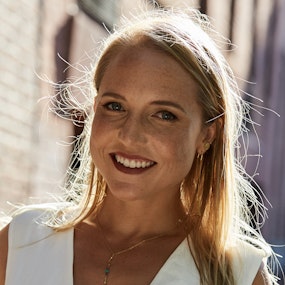
Kristin Wilson
Host of Badass Digital Nomads & YouTube's Traveling with Kristin / Author of Digital Nomads for Dummies
Kristin Wilson is a long-term digital nomad and location-independent entrepreneur who has lived and worked across 60 countries in 20 years. Since founding a fully-remote, international relocation company in 2011, she has helped more than 1,000 people retire or live abroad in 35 countries. Today, she helps aspiring remote workers, digital nomads, and expats achieve their lifestyle goals through her YouTube channel (Traveling with Kristin) and podcast, Badass Digital Nomads.
Kristin is the author of Digital Nomads for Dummies. She's also a Top Writer on Medium and Quora in the topics of business, travel, technology, life, productivity, digital nomads, and location independence. She has been featured on The Today Show, Bloomberg Businessweek, Business Insider, ESPN, The New York Times, WSJ, Huffpost, HGTV’s House Hunters International, and more.


























